The Magazine
👩💻 Welcome to OPIT’s blog! You will find relevant news on the education and computer science industry.
Search inside The Magazine
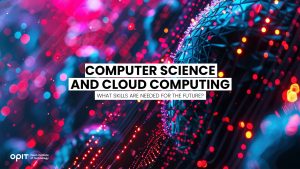
More and more students are turning to careers in computer science, and it’s easy to see why. The world is becoming increasingly reliant on and powered by modern technology with every passing day.
Emerging innovations like artificial intelligence (AI) and cloud computing are set to change the face of countless industries. This means qualifications in computer science unlock the doors to countless job opportunities.
However, this is also a dynamic and rapidly changing field – a field that demands a distinct set of core skills to not only achieve success, but also future-proof your career for years to come.
The Importance and Value of Computer Science and Cloud Computing Qualifications
Official statistics show that the European cloud computing market is set to experience an astonishing compound annual growth rate (CAGR) of almost 23% in the coming years, moving from a value of €110 billion in 2024 to a lower-end estimate €250 billion by 2028, and it won’t stop there.
The same sort of growth is being seen across the full spectrum of computer science fields and industries, with emerging technologies like AI, automation, and edge computing all spearheading the surging value and importance of these sectors.
The increasing shift away from conventional computing towards cloud computing shows just how quickly the technological world changes and evolves. It also demonstrates the need for professionals with a wide and varied range of skills, plus the ability to adapt to rapidly changing situations.
Those who can bring these skills to the table, supported by a comprehensive education and effective computer science qualifications, can enjoy:
- Entry into job markets that have exceptionally high levels of demand.
- Diverse career opportunities in fields that range from AI and machine learning to computer engineering and software development.
- Competitive salaries, with consistently high rates offered all around the world.
- Job security and stability, given the ever-increasing significance of technology in the modern world.
Core Skills to Master for Long Careers in Computer Science
Next, let’s look into the actual specific skills that computer science students and aspiring leaders will need to master to secure their futures.
Programming Languages
Being able to work with code is the bedrock of almost any career in computer science. Aspiring scientists will need to master one or several programming languages, including Java for building business and web apps, Python for web development, and C++ for system programming.
Networks and Architectures
Computer scientists also need a strong core knowledge of the fundamentals of the computing world, like how networks function, the various protocols and architectures that control the flow of data from device to device, etc.
Algorithms and Data
Algorithms play a fundamental role in fields like AI and machine learning, so computer scientists must understand how different algorithms and data structures drive computing processes, problem-solving, and development.
Software Development
Computer scientists may spend much of their time working on development projects post-graduation, which may include apps for the web, business, mobile, and more. A strong understanding of the stages of the software development lifecycle and processes involved is, therefore, essential.
Cloud Computing
With cloud computing growing in importance, unlocking whole new fields, like software as a service (SaaS) and desktop as a service (DaaS), the computer scientists of tomorrow will also need to have intricate knowledge of how cloud computing works and the potential it holds.
Soft Skills
Along with the many technical skills listed above, computer scientists will also benefit from vital soft skills that will help them when collaborating with others, presenting their ideas, driving innovation in their chosen fields, leading teams, and managing projects. These skills include:
- Being able to communicate effectively, both with fellow computer scientists and non-technical audiences as well
- Analytical thinking and problem-solving skills that help scientists understand and respond to challenges
- Adaptability, so that scientists can keep on learning, evolving their skill sets, and embracing new tech and ideas as they emerge
- The ability to work as part of a team, often fundamental for large-scale computing projects
- Attention to detail that allows you to spot that single line of code that needs fixing, or for tasks like debugging and data interpretation
Get the Best Start With a BSc in Computer Science at OPIT
We’ve seen the skills you need to succeed in computer science and cloud computing for years to come, but one question remains: where is the best place to gain these skills and acquire the necessary knowledge for genuine long-term success?
The answer: the Open Institute of Technology (OPIT).
An exclusively online learning platform specializing in computer science and digital business, OPIT offers a curated collection of online degrees for tomorrow’s technology leaders, including a Foundation Program for beginners, bachelor’s programs, and master’s degrees for the most experienced students.
Why Study at OPIT?
Advantages of studying with OPIT include:
- Accessible and flexible online learning to suit your needs and pace
- A focus on real-world applications of the skills and knowledge imparted
- A leading team of top tutors and professors from diverse fields and nations
- An international community of students with which to collaborate
- Progressive assessment of skills and knowledge, as opposed to exam-heavy schedules
Those planning pathways into computer science and cloud computing are best served by OPIT’s BSc in Computer Science program.
Lasting six terms and worth 180 ECTS credits, this fully remote, online, and accredited undergraduate degree was developed with insights from industry leaders, academics, and employers within the IT industry.
It equips graduates with both the fundamental theoretical knowledge they need to succeed in technology, as well as the practical skills required to enter the world of work and immediately innovate in fields like programming, cybersecurity, data science, AI, and cloud computing.
Like other courses and programs available at OPIT, this BSc in Computer Science provides students with a flexible learning program involving a mixture of recorded and engaging live content, progressive assessment, fast-track options for those who study at a faster pace, and round-the-clock accessibility to tutors and fellow learners.
If you feel that computer science or cloud computing is the right path for you, and you want to secure the foundational skills you need to succeed, consider the OPIT BSc in Computer Science to help you achieve your dreams.
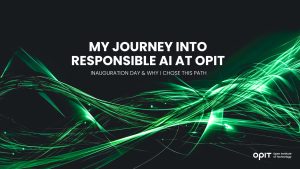
On September 8, 2025, the Open Institute of Technology (OPIT) officially inaugurated its 2025/26 academic year, welcoming a whole host of new students into the institute, ready to gain the skills and knowledge they need to be the tech industry leaders of tomorrow.
Faculty members, guest speakers from around the world, and hundreds of students from over 100 nations were all in attendance at the online inauguration event. Among them was one new student on the MSc in Responsible AI program: Rem Lampa, also known by his online alias, Kuya Dev.
A Filipino podcaster, speaker, and developer, Kuya Dev documented the inauguration experience in a YouTube video, sharing his thoughts on the event. Here’s a detailed look at his experience, showing the welcoming and effective way in which new OPIT students are brought into the institute from the first day.
An Overview of the Inauguration Event
The latest OPIT inauguration event was one to remember, with the institute celebrating several notable milestones. These included the first graduation of the MSc in Applied Data Science and AI program, and the unveiling of new industry connections and corporate partners offering opportunities for graduates.
Various guest speakers were in attendance, including the former Italian Minister of Education and current OPIT Rector, Professor Francesco Profumo, plus the CEO of Malta’s accreditation authority MFHEA, Dr. Rose Anne Cuschieri.
OPIT founder, Riccardo Ocleppo, also took to the stage to highlight the transformative role of education and the unique possibilities offered by the online-only OPIT degrees, stating:
“When we launched OPIT in 2022, we wanted to prove that an online degree could be rigorous, international, deeply connected to the world of work, and engaging. Three years later, we can already see results. This year alone, 300 new students are joining us, representing 98 nationalities.”
Those hundreds of new students were also, naturally, in attendance for their big inauguration day, welcomed into the institute’s various BSc and MSc programs in specialties like Computer Science, Digital Business, Digital Business and Innovation, and Cybersecurity.
Introducing Rem ‘Kuya Dev’ Lampa
As mentioned, one of the new students joining was vlogger and podcaster, Kuya Dev.
Already boasting extensive experience and technical expertise in the computing world, Kuya Dev has founded several tech communities, including Tech Career Shifter Philippines and Server-Side JavaScript.
He describes himself as an advocate for responsible AI and tech practices, and once gave a powerful TEDx talk about the negative potential impacts of artificial intelligence (AI), including its large carbon footprint and involving exploitation of workers in emerging nations. So, it was only fitting that he signed up for OPIT’s MSc in Responsible AI.
The MSc in Responsible AI Program
A postgraduate program lasting three or four terms (between 12 and 24 months, total), OPIT’s MSc in Responsible AI is an accredited program that combines technical skills with a core focus on the ethical implications of AI technology.
It explores real-world use cases of AI and ways in which this exciting and powerful technology can be used responsibly and sustainably, emphasizing its potential for both positive and negative change in areas such as the environment and society as a whole.
Students of this program enjoy all the usual benefits that come with studying at OPIT, like flexible-paced learning, tutors available on a daily basis, a dynamic and engaging online learning environment, and fair, progressive assessments over time.
Those who graduate can move into careers in AI Application Development, AI Research, and AI Business Consulting.
Highlights and Impressions of Kuya Dev’s Inauguration Experience
Inauguration is always a special moment in any student’s academic journey as they take their first tentative yet exciting steps towards new knowledge and skills that can unlock their potential and accelerate their development.
It can even be a “make-or-break” moment in which students can either feel welcomed, empowered, and eager to begin their studies, or, conversely, experience feelings of worry, doubt, or regret if the inauguration lacks the spark they were hoping to feel.
Fortunately, Kuya Dev and his many fellow new OPIT students had a very positive experience at the inauguration event, with the vlogger calling it both “very fruitful” and “very insightful.” Some of the specific highlights he mentioned included:
An International Community
Early in the inauguration event, Kuya Dev heard from Professor Francesco Profumo about how OPIT was welcoming students from over 90 countries.
This, for Kuya Dev and for so many other students, is one of the big perks of studying with OPIT. It allows students to meet, engage, and exchange with people from dozens of different backgrounds, cultures, and communities, learning new ways of thinking and collaborating.
Real World Applications
The OPIT inauguration also focused on another of the university’s key features: a focus not merely on imparting knowledge to students or making them memorize facts, figures, and theorems, but actually teaching them how to apply that knowledge and ideas to real-world uses.
Kuya Dev commented on how other universities that he had considered attending appeared more conventional and limited in their approach, and also shared his excitement and enthusiasm at OPIT’s unique approach, focusing more on genuine industry collaboration and real-life scenarios.
Inspiring Speakers
The vlogger and podcaster also commented on the various key speakers who hosted the event. He was pleased to see that they were not only academically oriented but also all had real-world experience and a diverse range of working backgrounds in fields like politics.
This, too, is part of what makes OPIT different. It features a winning team of international tutors, professors, and experts from diverse fields, including the aforementioned former Italian Education Minister, education executives, research chairs, digital content creation specialists, and more.
Graduate Experiences
Finally, Kuya Dev noted how several OPIT graduates spoke to those about to follow the same path they did, including students from nations as diverse as the U.S., Italy, and Nigeria.
They all shared their experiences and detailed what they enjoyed most about studying with OPIT, including key factors such as professors who took the time to get to know their students, as well as the depth of the topics and knowledge covered in each course.
A Successful First Step Into OPIT Education
All in all, the recent inauguration event was a major success for all involved, giving students like Kuya Dev the ideal introduction to life and study with OPIT. He, like so many of his new fellow students, left the event eager and excited to expand their knowledge and broaden their horizons in unique ways that only OPIT can provide.
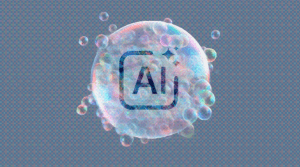
Source:
- Metro, published on October 09th, 2025
After ChatGPT came on the scene in 2022, the tech industry quickly began comparing the arrival of AI to the dawn of the internet in the 1990s.
Back then, dot-com whizzes were minting easy millions only for the bubble to burst in 2000 when interest rates were hiked. Investors sold off their holdings, companies went bust and people lost their jobs.
Now central bank officials are worried that the AI industry may see a similar boom and bust.
A record of the Financial Policy Committee’s October 2 meeting shows officials saying financial market evaluations of AI ‘appear stretched’.
‘This, when combined with increasing concentration within market indices, leaves equity markets particularly exposed should expectations around the impact of AI become less optimistic,’ they added.
AI-focused stocks are mainly in US markets but as so many investors across the world have bought into it, a fallout would be felt globally.
ChatGPT creator OpenAI, chip-maker Nvidia and cloud service firm Oracle are among the AI poster companies being priced big this year.
Earnings are ‘comparable to the peak of the dot-com bubble’, committee members said.
Factors like limited resources – think power-hungry data centres, utilities and software that companies are spending billions on – and the unpredictability of the world’s politics could lead to a drop in stock prices, called a ‘correction’.
In other words, the committee said, investors may be ignoring how risky AI technology is.
Metro spoke with nearly a dozen financial analysts, AI experts and stock researchers about whether AI will suffer a similar fate. There were mixed feelings.
‘Every bubble starts with a story people want to believe,’ says Dat Ngo, of the trading guide, Vetted Prop Firms.
‘In the late 90s, it was the internet. Today, it’s artificial intelligence. The parallels are hard to ignore: skyrocketing stock prices, endless hype and companies investing billions before fully proving their business models.
‘The Bank of England’s warning isn’t alarmist – it’s realistic. When too much capital chases the same dream, expectations outpace results and corrections follow.’
Dr Alessia Paccagnini, an associate Professor from the University College Dublin’s Michael Smurfit Graduate Business School, says that companies are spending £300billion annually on AI infrastructure, while shoppers are spending $12billion. That’s a big difference.
Tech firms listed in the US now represent 30% of New York’s stock index, S&P 500 Index, the highest proportion in 50 years.
‘As a worst-case scenario, if the bubble does burst, the immediate consequences would be severe – a sharp market correction could wipe trillions from stock valuations, hitting retirement accounts and pension funds hard,’ Dr Paccagnini adds.
‘In my opinion, we should be worried, but being prepared could help us avoid the worst outcomes.’
One reason a correction would be so bad is because of how tangled-up the AI world is, says George Sweeney, an investing expert at the personal finance website site Finder.
‘If it fails to meet the lofty expectations, we could see an almighty unravelling of the AI hype that spooks markets, leading to a serious correction,’ he says.
Despite scepticism, AI feels like it’s everywhere these days, from dog bowls and fridges to toothbrushes and bird feeders.
And it might continue that way for a while, even if not as enthusiastically as before, says Professor Filip Bialy, who specialises in computer science and AI ethics at the at Open Institute of Technology.
‘TAI hype – an overly optimistic view of the technological and economic potential of the current paradigm of AI – contributes to the growth of the bubble,’ he says.
‘However, the hype may end not with the burst of the bubble but rather with a more mature understanding of the technology.’
Some stock researchers worry that the AI boom could lose steam when the companies spending billions on the tech see profits dip.
The AI analytic company Qlik found that only one in 10 business say their AI initiatives are seeing sizeable returns.
Qlik’s chief strategy officer, James Fisher, says this doesn’t show that the hype for AI is bursting, ‘but how businesses look at AI is changing’.
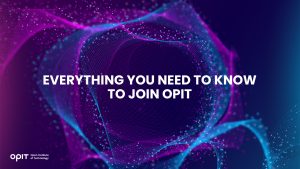
OPIT – Open Institute of Technology offers an innovative and exciting way to learn about technology. It offers a range of bachelor’s and master’s programs, plus a Foundation Year program for those taking the first steps towards higher education. Through its blend of instruction-based and independent learning, it empowers ambitious minds with the skills and knowledge needed to succeed.
This guide covers all you need to know to join OPIT and start your educational journey.
Introducing the Open Institute of Technology
Before we dig into the nitty-gritty of the OPIT application process, here’s a brief introduction to OPIT.
OPIT is a fully accredited Higher Education Institution under the European Qualification Framework (EQF) and the MFHEA Authority. It offers exclusively online education in English to an international community of students. With a winning team of top professors and a specific focus on computer science, it trains the technology leaders of tomorrow.
Some of the unique elements that characterize OPIT’s approach include:
- No final exams. Instead, students undergo progressive assessments over time
- A job-oriented, practical focus on the courses
- 24/7 support, including AI assistance and student communities, so everyone feels supported
- A strong network of company connections, unlocking doors for graduates
Reasons to Join OPIT
There are many reasons for ambitious students and aspiring tech professionals to study with OPIT.
Firstly, since all the study takes place online, it’s a very flexible and pleasant way to learn. Students don’t feel the usual pressures or suffer the same constraints they would at a physical college or university. They can attend from anywhere, including their own homes, and study at a pace that suits them.
OPIT is also a specialist in the technology field. It only offers courses focused on tech and computer science, with a team of professors and tutors who lead the way in these topics. This ensures that students get high-caliber learning opportunities in this specific sector.
Learning at OPIT is also hands-on and applicable to real-world situations, despite taking place online. Students are not just taught core skills and knowledge, but are also shown how to apply those skills and knowledge in their future careers.
In addition, OPIT strives to make technology education as accessible, inclusive, and affordable as possible. Entry requirements are relatively relaxed, fees are fair, and students from around the world are welcome here.
What You Need to Know About Joining OPIT
Now you know why it’s worth joining OPIT, let’s take a closer look at how to go about it. The following sections will cover how to apply to OPIT, entry requirements, and fees.
The OPIT Application Process
Unsurprisingly for an online-only institution, the application process for OPIT is all online, too. Users can submit the relevant documents and information on their computers from the comfort of their homes.
- Visit the official OPIT site and click the “Apply now” button to get started, filling out the relevant forms.
- Upload your supporting documents. These can include your CV, as well as certificates to prove your past educational accomplishments and level of English.
- Take part in an interview. This should last no more than 30 minutes. It’s a chance for you to talk about your ambitions and background, and to ask questions you might have about OPIT.
That’s it. Once you complete the above steps, you will be admitted to your chosen course and can start enjoying OPIT education once the first term begins. You’ll need to sign your admissions contract and pay the relevant fees, then begin classes.
Entry Requirements for OPIT Courses
OPIT offers a small curated collection of courses, each with its own requirements. You can consult the relevant pages on the official OPIT site to find out the exact details.
For the Foundation Program, for example, you simply need an MQF/EQF Level 3 or equivalent qualification. You also need to demonstrate a minimum B2 level of English comprehension.
For the BSc in Digital Business, applicants should have a higher secondary school leaving certificate, plus B2-level English comprehension. You can also support your application with a credit transfer from previous studies or relevant work experience.
Overall, the requirements are simple, and it’s most important for applicants to be ambitious and eager to build successful careers in the world of technology. Those who are driven and committed will get the best from OPIT’s instruction.
Fees and Flexible Payments at OPIT
As mentioned above, OPIT makes technological education accessible and affordable for all. Its tuition fees cover all relevant teaching materials, and there are no hidden costs or extras. The institute also offers flexible payment options for those with different budgets.
Again, exact fees vary depending on which course you want to take, so it’s important to consult the specific info for each one. You can pay in advance to enjoy 10% off the final cost, or refer a friend to also obtain a discount.
In addition to this, OPIT offers need-based and merit-based scholarships. Successful candidates can obtain discounts of up to 40% on bachelor’s and master’s tuition fees. This can substantially bring the term cost of each program down, making OPIT education even more accessible.
Credit Transfers and Experience
Those who are entering OPIT with pre-existing work experience or relevant academic achievements can benefit from the credit transfer program. This allows you to potentially skip certain modules or even entire semesters if you already have relevant experience in those fields.
OPIT is flexible and fair in terms of recognizing prior learning. So, as long as you can prove your credentials and experience, this could be a beneficial option for you. The easiest way to find out more and get started is to email the OPIT team directly.
Join OPIT Today
Overall, the process to join OPIT is designed to be as easy and stress-free as possible. Everything from the initial application forms to the interview and admission process is straightforward. Requirements and fees are flexible, so people in different situations and from different backgrounds can get the education they want. Reach out to OPIT today to take your first steps to tech success.
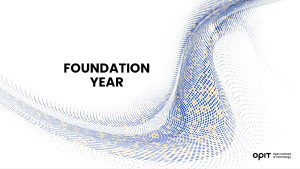
With the proliferation of the internet, the rise of smart devices, and the emergence of AI, the world has become increasingly technological. Unsurprisingly, then, many young and ambitious minds are eager to engage with technology on a professional scale, planning careers in the field. But to succeed in the complex, evolving world of tech, it helps to have a strong foundation of core skills.
That’s where the Foundation Year Program at the Open Institute of Technology (OPIT) comes into play. This program gives students the knowledge and skills they need to succeed. Covering digital business, computer science, mathematics, and other important topics, it prepares tech leaders of tomorrow for the next steps in their development.
Introducing OPIT
The Open Institute of Technology is a fully accredited Higher Education Institution under the European Qualification Framework (EQF) and the MFHEA Authority. It offers both bachelor’s and master’s degrees, in addition to the Foundation Program. OPIT’s mission is to provide high-quality, inclusive, and affordable technology education.
The institute distinguishes itself from other educational establishments as follows:
- Exclusively online education, delivered in English
- A team of top professors from leading universities around the globe
- No final exams, but a system of progressive assessment to track students’ progress organically
- European-level accreditation
- Round-the-clock support
- Affordable prices
Education at OPIT is flexible, focused, and built for career success. Its hands-on approach to learning can unlock countless doors of opportunity for those who enroll.
Learning Methodology for the OPIT Foundation Year
Technology is a rapidly evolving field. However, higher education in technology has stagnated somewhat. That was the view of Riccardo Ocieppo, and it was the reason he founded OPIT. He wanted to provide an innovative, online, and international institution to prepare students for careers in technology in the best ways possible.
OPIT delivers on this mission through an innovative approach to learning. This approach is centered around competence-based teaching. In other words, OPIT not only teaches students foundational skills but also demonstrates the practical, real-world applications of those skills.
In addition, despite being entirely online, the Foundation Program aims to foster a sense of community. Students have continuous access to their peers, tutors, and professors. This way, they always feel part of a team, and they never feel cut off or isolated from their educational community.
An Overview of the Foundation Program
The Foundation Program is OPIT’s sole pre-bachelor program. As its name implies, it focuses on foundational knowledge and skills. It equips students with the education they need to springboard onwards into further education, like a bachelor’s degree. This is invaluable, as too many students have the drive to begin degrees in technology, but lack the required MQF or EQF Level 4 qualification.
The Foundation Program provides a pathway for students in that situation and others. It eases their entry into the professional technological world. Core aims of the program include:
- Strengthen technical proficiency
- Development of an understanding of ethical and social responsibility relevant to technology
- Promotion of a human-centered approach to technology
- Improvement in core skills like mathematics, English, and computer literacy
- Creation of an EQF Level 4-tier academic base, so students can proceed into a bachelor’s degree
The Foundation Program lasts for six months and is fully online. It is comprised of two terms, lasting 13 weeks each. Students complete three courses per term, each worth 10 ECTS credits, for a total of 60 credits.
The instruction is delivered in several formats. These include video lectures, learning materials such as e-books, and weekly live sessions. Students must also complete two to three assessments during the course. These, too, can take multiple formats, like tests, essays, and projects.
By the end of the course, students will have a stronger understanding of technology. They will also have gained or improved upon numerous essential skills needed to move on with their education. They will be better prepared to succeed, no matter which direction they choose to follow next.
Student Support Systems
To ensure no student feels isolated or lacking assistance, OPIT offers a strong support system.
For example, the institute’s professors regularly check in with students, answer queries, and provide vital guidance. OPIT also provides an AI assistant that has been specially trained to help students succeed. The OPIT AI Copilot answers questions instantly, finds resources, sums up complex topics, and more. Students can also chat with one another over Slack, so no one will ever feel alone.
Future Prospects
The OPIT Foundation Program is all about preparation. It’s about getting students ready for the next steps, and it unlocks a lot of doors. For those who haven’t got a formal Level 4 qualification, for example, the Foundation Program creates a path to bachelor’s degrees. It lets students move on to a BSc in Digital Business or a BSc in Modern Computer Science, for example.
What’s more, those who intend to continue their education with OPIT receive several big benefits. These include a 25% scholarship reduction in tuition fees for any OPIT bachelor’s program. Plus, those who follow the Foundation Program will become familiar with OPIT’s modes of education and the OPIT community. So, transitioning onward into a degree should be easy and seamless.
Admissions Information and Requirements
For those who are interested in pursuing a foundation year with OPIT, there are certain requirements:
- Applicants must hold a High School Leaving Certificate in any discipline.
- They must also demonstrate a certain level of English language ability.
The application process is entirely online. Applicants will have to provide some information and supporting documents. They will be invited to a 30-minute interview to discuss their background and ambitions. Once admitted, it’s simply a matter of signing the relevant paperwork, paying the fees, and officially entering the OPIT community.
A Solid Foundation Year for Future Success
The OPIT Foundation Program breaks the barriers that have prevented ambitious technology enthusiasts from pursuing their dreams. In this exciting sphere, it leads the way towards higher education and gives students the knowledge they need to succeed. It is the ideal way to begin your journey towards a long and fulfilling career in technology.
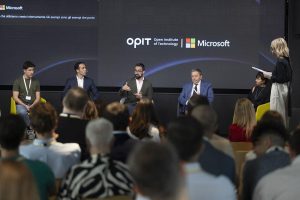
Source:
- Times of Malta, published on September 18th, 2025
4 min read
The gathering brought together academics and technology leaders from prominent European Institutions, such as Instituto de Empresa (IE University), OPIT itself and the Royal College of Arts, to explore how artificial intelligence is reshaping the university experience.
The OPIT AI Copilot has been trained on the institute’s complete academic archive, a collection created over the past three years that includes 131 courses, more than 3,500 hours of recorded lectures, 7,500 study resources, 320 certified assessments, and thousands of exercises and original learning documents.
Unlike generic AI tools, the Copilot is deeply integrated with OPIT’s learning management system, allowing it to track each student’s progress and provide tailored support.
This integration means the assistant can reference relevant sources within the learning environment, adapt to the student’s stage of study, and ensure that unreleased course content remains inaccessible.
A mobile app is also scheduled for release this autumn, that will allow students to download exercise and access other tools.
During examinations, the Copilot automatically switches to what the institute calls an “anti-cheating mode”, restricting itself to general research support rather than providing direct answers.
For OPIT’s international community of 500 students from nearly 100 countries, many of whom balance studies with full-time work, the ability to access personalised assistance at any time of day is a key advantage.
“Eighty-five per cent of students are already using large language models in some way to study,” said OPIT founder and director Riccardo Ocleppo. “We wanted to go further by creating a solution tailored to our own community, reflecting the real experiences of remote learners and working professionals.”
Tool aims to cut correction time by 30%
The Copilot will also reduce administrative burdens for faculty. It can help grade assignments, generate new educational materials, and create rubrics that allow teachers to cut correction time by as much as 30 per cent.
According to OPIT, this will free up staff to dedicate more time to teaching and direct student engagement.
At the Milan event, Rector Francesco Profumo underlined the broader implications of AI in higher education. “We are in the midst of a deep transformation, where AI is no longer just a tool: it is an environment that radically changes how we learn, teach, and create,” he said.
“But it is not a shortcut. It is a cultural, ethical, and pedagogical challenge, and to meet it we must have the courage to rethink traditional models and build bridges between human and artificial intelligence.”
OPIT was joined on stage by representatives from other leading institutions, including Danielle Barrios O’Neill of the Royal College of Art, who spoke about the role of AI in art and creativity, and Francisco Machin of IE University, who discussed applications in business and management education.
OPIT student Asya Mantovani, also employed at a leading technology and consulting firm in Italy, gave a first-hand account of balancing professional life with online study.
The assistant has been in development for the past eight months, involving a team of OPIT professors, researchers, and engineers.
Ocleppo stressed that OPIT intends to make its AI innovations available beyond its own institution. “We want to put technology at the service of higher education,” he said.
“Our goal is to develop solutions not only for our own students, but also to share with global institutions eager to innovate the learning experience in a future that is approaching very quickly.”
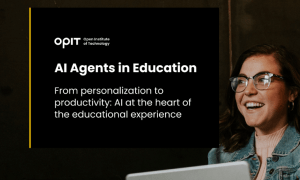
From personalization to productivity: AI at the heart of the educational experience.
Click this link to read and download the e-book.
At its core, teaching is a simple endeavour. The experienced and learned pass on their knowledge and wisdom to new generations. Nothing has changed in that regard. What has changed is how new technologies emerge to facilitate that passing on of knowledge. The printing press, computers, the internet – all have transformed how educators teach and how students learn.
Artificial intelligence (AI) is the next game-changer in the educational space.
Specifically, AI agents have emerged as tools that utilize all of AI’s core strengths, such as data gathering and analysis, pattern identification, and information condensing. Those strengths have been refined, first into simple chatbots capable of providing answers, and now into agents capable of adapting how they learn and adjusting to the environment in which they’re placed. This adaptability, in particular, makes AI agents vital in the educational realm.
The reasons why are simple. AI agents can collect, analyse, and condense massive amounts of educational material across multiple subject areas. More importantly, they can deliver that information to students while observing how the students engage with the material presented. Those observations open the door for tweaks. An AI agent learns alongside their student. Only, the agent’s learning focuses on how it can adapt its delivery to account for a student’s strengths, weaknesses, interests, and existing knowledge.
Think of an AI agent like having a tutor – one who eschews set lesson plans in favour of an adaptive approach designed and tweaked constantly for each specific student.
In this eBook, the Open Institute of Technology (OPIT) will take you on a journey through the world of AI agents as they pertain to education. You will learn what these agents are, how they work, and what they’re capable of achieving in the educational sector. We also explore best practices and key approaches, focusing on how educators can use AI agents to the benefit of their students. Finally, we will discuss other AI tools that both complement and enhance an AI agent’s capabilities, ensuring you deliver the best possible educational experience to your students.

The Open Institute of Technology (OPIT) began enrolling students in 2023 to help bridge the skills gap between traditional university education and the requirements of the modern workplace. OPIT’s MSc courses aim to help professionals make a greater impact on their workplace through technology.
OPIT’s courses have become popular with business leaders hoping to develop a strong technical foundation to understand technologies, such as artificial intelligence (AI) and cybersecurity, that are shaping their industry. But OPIT is also attracting professionals with strong technical expertise looking to engage more deeply with the strategic side of digital innovation. This is the story of one such student, Obiora Awogu.
Meet Obiora
Obiora Awogu is a cybersecurity expert from Nigeria with a wealth of credentials and experience from working in the industry for a decade. Working in a lead data security role, he was considering “what’s next” for his career. He was contemplating earning an MSc to add to his list of qualifications he did not yet have, but which could open important doors. He discussed the idea with his mentor, who recommended OPIT, where he himself was already enrolled in an MSc program.
Obiora started looking at the program as a box-checking exercise, but quickly realized that it had so much more to offer. As well as being a fully EU-accredited course that could provide new opportunities with companies around the world, he recognized that the course was designed for people like him, who were ready to go from building to leading.
OPIT’s MSc in Cybersecurity
OPIT’s MSc in Cybersecurity launched in 2024 as a fully online and flexible program ideal for busy professionals like Obiora who want to study without taking a career break.
The course integrates technical and leadership expertise, equipping students to not only implement cybersecurity solutions but also lead cybersecurity initiatives. The curriculum combines technical training with real-world applications, emphasizing hands-on experience and soft skills development alongside hard technical know-how.
The course is led by Tom Vazdar, the Area Chair for Cybersecurity at OPIT, as well as the Chief Security Officer at Erste Bank Croatia and an Advisory Board Member for EC3 European Cybercrime Center. He is representative of the type of faculty OPIT recruits, who are both great teachers and active industry professionals dealing with current challenges daily.
Experts such as Matthew Jelavic, the CEO at CIM Chartered Manager Canada and President of Strategy One Consulting; Mahynour Ahmed, Senior Cloud Security Engineer at Grant Thornton LLP; and Sylvester Kaczmarek, former Chief Scientific Officer at We Space Technologies, join him.
Course content includes:
- Cybersecurity fundamentals and governance
- Network security and intrusion detection
- Legal aspects and compliance
- Cryptography and secure communications
- Data analytics and risk management
- Generative AI cybersecurity
- Business resilience and response strategies
- Behavioral cybersecurity
- Cloud and IoT security
- Secure software development
- Critical thinking and problem-solving
- Leadership and communication in cybersecurity
- AI-driven forensic analysis in cybersecurity
As with all OPIT’s MSc courses, it wraps up with a capstone project and dissertation, which sees students apply their skills in the real world, either with their existing company or through apprenticeship programs. This not only gives students hands-on experience, but also helps them demonstrate their added value when seeking new opportunities.
Obiora’s Experience
Speaking of his experience with OPIT, Obiora said that it went above and beyond what he expected. He was not surprised by the technical content, in which he was already well-versed, but rather the change in perspective that the course gave him. It helped him move from seeing himself as someone who implements cybersecurity solutions to someone who could shape strategy at the highest levels of an organization.
OPIT’s MSc has given Obiora the skills to speak to boards, connect risk with business priorities, and build organizations that don’t just defend against cyber risks but adapt to a changing digital world. He commented that studying at OPIT did not give him answers; instead, it gave him better questions and the tools to lead. Of course, it also ticks the MSc box, and while that might not be the main reason for studying at OPIT, it is certainly a clear benefit.
Obiora has now moved into a leading Chief Information Security Officer Role at MoMo, Payment Service Bank for MTN. There, he is building cyber-resilient financial systems, contributing to public-private partnerships, and mentoring the next generation of cybersecurity experts.
Leading Cybersecurity in Africa
As well as having a significant impact within his own organization, studying at OPIT has helped Obiora develop the skills and confidence needed to become a leader in the cybersecurity industry across Africa.
In March 2025, Obiora was featured on the cover of CIO Africa Magazine and was then a panelist on the “Future of Cybersecurity Careers in the Age of Generative AI” for Comercio Ltd. The Lagos Chamber of Commerce and Industry also invited him to speak on Cybersecurity in Africa.
Obiora recently presented the keynote speech at the Hackers Secret Conference 2025 on “Code in the Shadows: Harnessing the Human-AI Partnership in Cybersecurity.” In the talk, he explored how AI is revolutionizing incident response, enhancing its speed, precision, and proactivity, and improving on human-AI collaboration.
An OPIT Success Story
Talking about Obiora’s success, the OPIT Area Chair for Cybersecurity said:
“Obiora is a perfect example of what this program was designed for – experienced professionals ready to scale their impact beyond operations. It’s been inspiring to watch him transform technical excellence into strategic leadership. Africa’s cybersecurity landscape is stronger with people like him at the helm. Bravo, Obiora!”
Learn more about OPIT’s MSc in Cybersecurity and how it can support the next steps of your career.
Have questions?
Visit our FAQ page or get in touch with us!
Write us at +39 335 576 0263
Get in touch at hello@opit.com
Talk to one of our Study Advisors
We are international
We can speak in:
